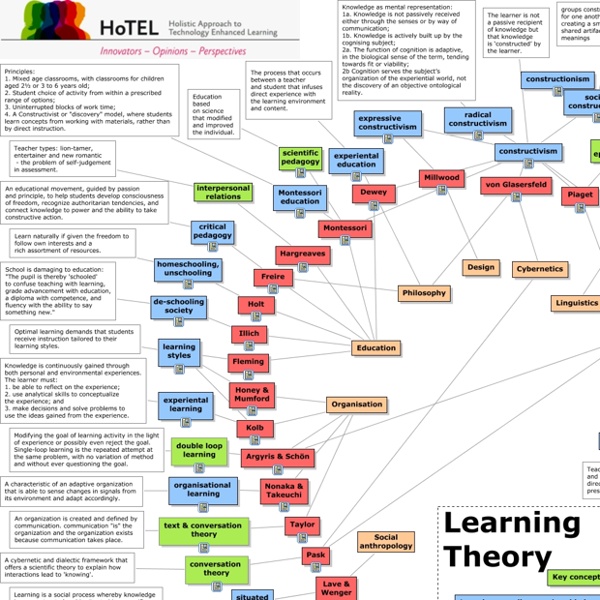



http://cmapspublic3.ihmc.us/rid=1LGVGJY66-CCD5CZ-12G3/Learning%20Theory.cmap
Related: Metodologia • Apprendre à apprendre • Pedagogy • IAThe 10 Most Important Work Skills in 2020 Share this infographic on your site! <a href=" src=" alt="Important Work Skills for 2020" width="500" border="0" /></a><br />Source: <a href=" The 10 Most Important Work Skills in 2020 Future Work Skills of 2020: Sources: The Secret to Student Success? Teach Them How to Learn. Sometimes the details former students recall from class is nothing short of amazing. A few years ago I had a student named Abby in my history class, who had always been in self-contained special education classrooms. Her teacher wanted her in my class for socialization purposes, and she did well. A year later, Abby began stopping by my class to deliver notes from the office a few times a week and I was always delighted to see her.
35 Educational Resources to Encourage Inquiry & Inventive Thinking This is a sponsored post. I’ve scoured the internet, including all of my favourite social media sites, to bring you a fantastic collection of online inquiry and inventive thinking resources that I know will inspire and motivate both you and your students. The collection includes Lego, science, practical activity ideas, engineering, videos, animation, technology and a tonne of fun facts – so there is sure to be something for everyone! Sean Kenney Lego Certified Master Builder’s YouTube Channel: Best-selling author and artist, Sean Kenney, uses LEGO toys to build anything and everything you can imagine. CSIRO Crest: CREativity in Science and Technology (CREST) is an Australian non-competitive awards program supporting students to design and carry out their own open-ended science investigation or technology project.
Learning Styles, ha, ha, ha, ha I wrote this post in Thursday, December 08, 2005, but I’m reposting it here because some people still have not got the message. Normally, I would not expect to get many chuckles from a 186-page report entitled Learning styles and pedagogy post-16 learning A systematic and critical review, 2004, by Frank Coffield, Institute of Education, University of London; David Moseley, University of Newcastle; Elaine Hall, University of Newcastle; Kathryn Ecclestone, University of Exeter. This is an exception. This marvelously tongue-in-cheek report looks at 800 studies of learning styles and concludes that there are better uses for educational funding. “Learning style awareness is only a ‘cog in the wheel of the learning process’ and ‘it is not very likely that the self-concept of a student, once he or she has reached a certain age, will drastically develop by learning about his or her personal style’.” And how about this?
K-5 iPad Apps for Analyzing (Bloom's Revised Taxonomy, Part 4) We are all born with a natural curiosity that relies on our ability to analyze. It is how we initially learn to understand and make sense of our world. When Benjamin Bloom writes about the fourth learning stage, analysis, he primarily refers to our ability to analyze written content. The 5 Best TED Talks for Teachers December 18, 2014 TED talks are invaluable resources for teachers professional development. They cover a wide variety of education related topics and provide a very good source of inspiration for teachers and students. Throughout the year we have been sharing with you some interesting talks from renowned speakers and educators and today we have had a look back at those talks and picked out 5 of the most popular talks within the education community.
Publications — LRN Allaire-Duquette, G., Belanger, M., Grabner, R. H., Koschutnig, K., & Masson, S. (2019). Individual differences in science competence among students are associated with ventrolateral prefrontal cortex activation. Social Media for Teachers: Guides, Resources, and Ideas Although students are evermore connected to the social web, many of these networks remain out-of-class digital playgrounds where students congregate. In a 2014 survey of 1,000 teachers, just one in five said they use social media regularly with students. Of course, it can be a challenge to incorporate social media into lessons. How To Kill A Learner's Curiosity In 10 Easy Steps How To Kill Learner Curiosity In 12 Easy Steps by Terry Heick Ed note: This has been updated from a 2012 post that you may or may not have already read. So, there’s that. Killing a learner’s natural curiosity doesn’t happen overnight.
K-5 iPad Apps According to Bloom's Taxonomy An elementary library media specialist reviews iPad apps as they map to an updated version of Bloom's Taxonomy in this six-part series. Diane Darrow is an artist, Reading Recovery teacher, and library media specialist at Bel Aire Elementary in Tiburon, CA. You can follow her on Twitter at @dianedarrow. In this six-part series, I will highlight apps useful for developing higher order thinking skills in grades K-5 classrooms. Each list will highlight a few apps that connect to the various stages on Bloom's continuum of learning. Given the size and current exponential growth of the app market, I will also assist educators in setting criteria necessary to identify apps that maintain the integrity of teaching for thinking.